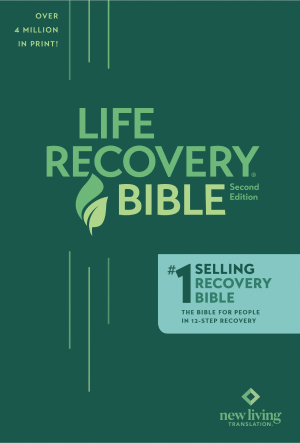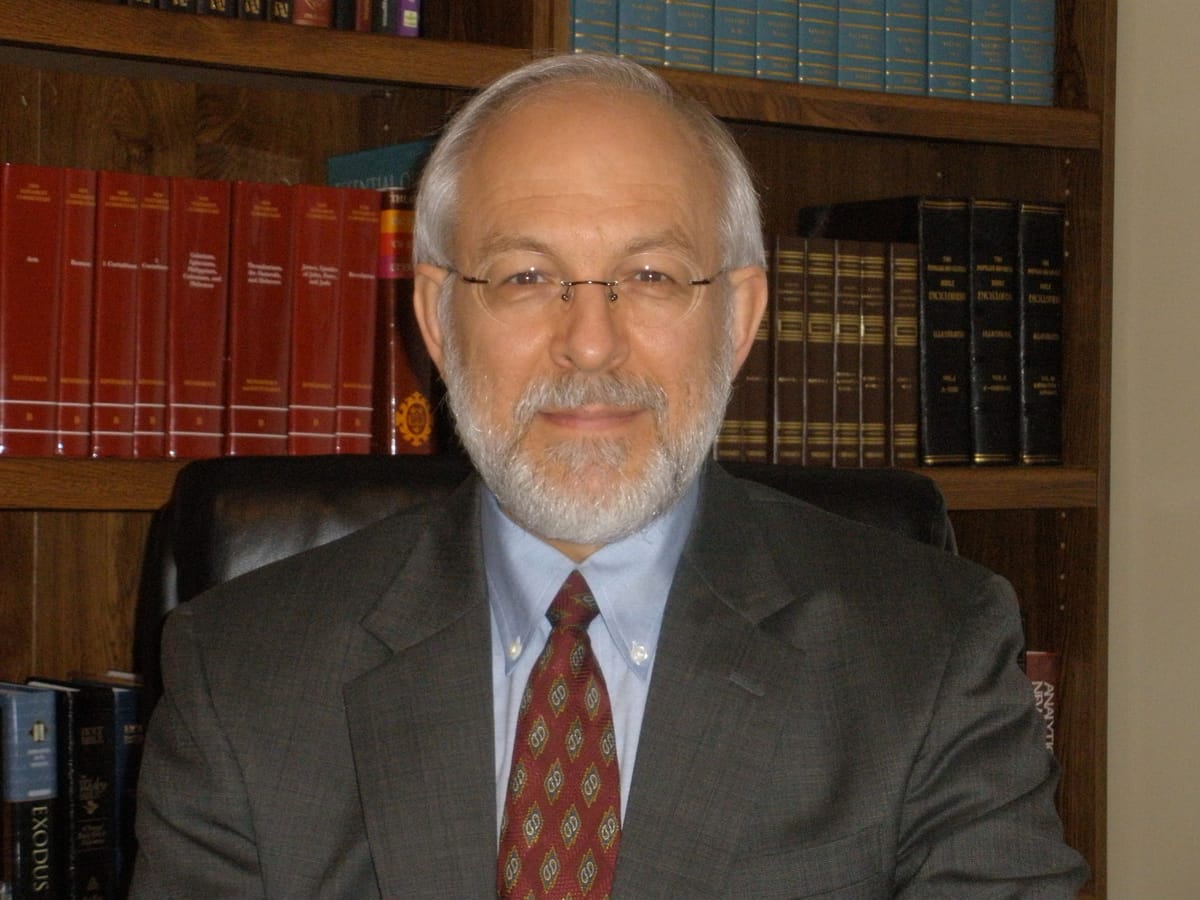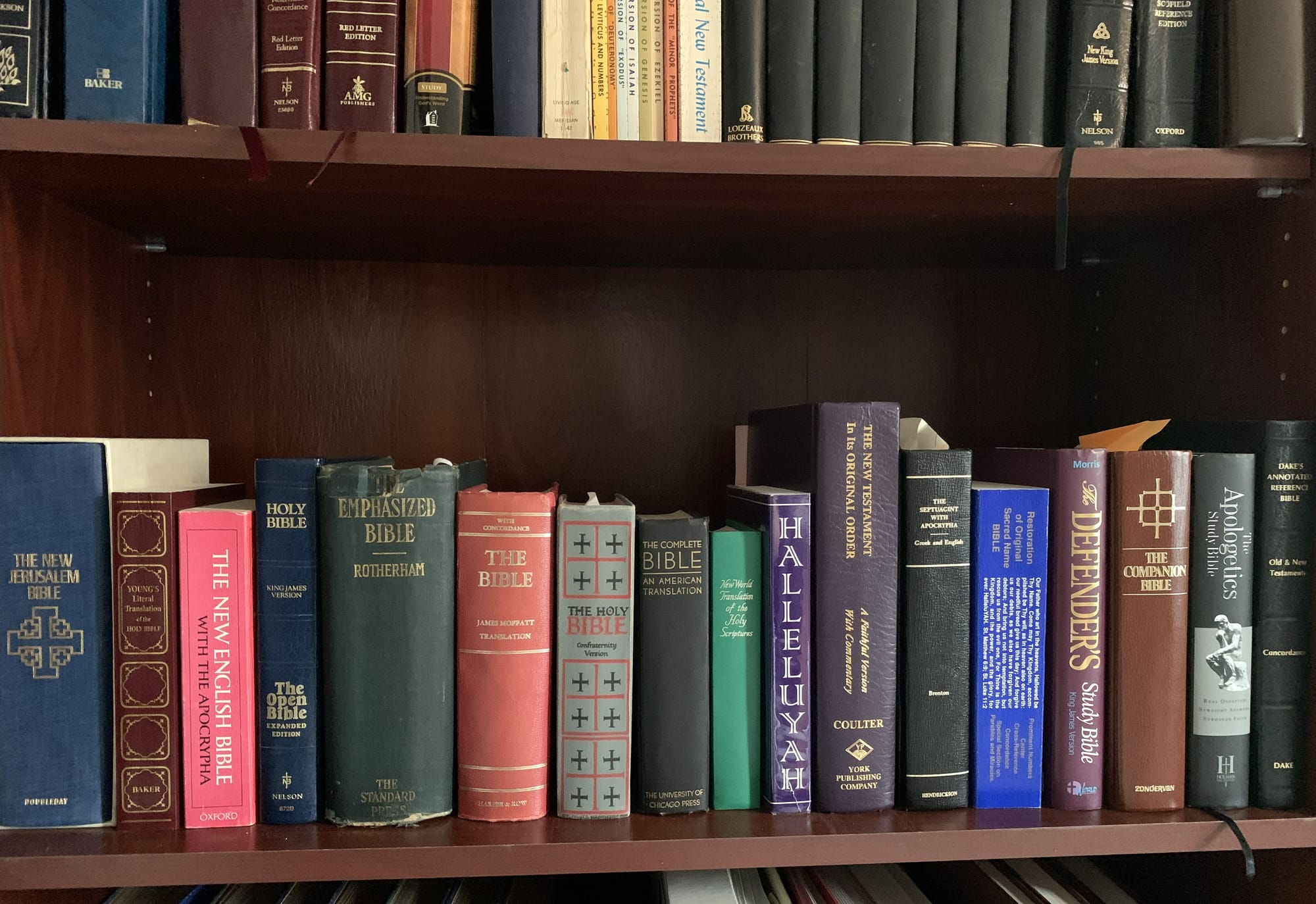Chapter 1, Section 1: Introduction
Today we commence a lengthy series teaching from and about the Bible. “… from and about the Bible.” In that simple phrase arises a most important question; namely, when we say “the Bible,” which Bible or which version of the Bible do we mean?
Presently, there are over 450 known versions of the Bible in the English language alone. This number reflects the wide range of translations, revisions, and paraphrases that have been produced over time, but most of that 450 number have been produced in the past century.
Some sources cite a lower number—such as around 50 major English versions—but this typically refers to the most widely-recognized or supposedly “authoritative” translations, whereas the higher figure accounts for a broader range of editions, including less common or specialized versions.
For example, did you know that the NLT Life Recovery Bible is an English Bible specifically designed for individuals in recovery from addiction, including alcoholism, and is widely used in 12-step programs like Alcoholics Anonymous? (NLT is the New Living Translation.) Many other “specialty” Bibles abound.

This large number is due to a number of factors including the evolution of the English language over the centuries, differing translation philosophies (such as word-for-word translations vs. thought-for-thought methods), and the diverse needs of various Christian denominations and readers.
The complete Bible has been translated into well over 700 languages, with portions of the Holy Scriptures available in over 3,600 languages. In our study, we are obviously focused chiefly upon English versions, but we shall discuss others as they are pertinent to the English versions.
Which Bible do most of us use? In no particular order, here are a few that may be popular in our audience and we shall mention others as we proceed. The King James Version, the New King James, the New American Standard, the Geneva Bible, the New International Version, The Amplified Version, the Holy Name Bible, the Revised Standard Version, the New Revised Standard Version, the Ferrar Fenton Version, the New Jerusalem Bible? Many Christians use a variety of Bible versions. I did—without knowledge of key differences. And I still do—when it is necessary—but I primarily use one version as my chief Bible for study and general reading.
Chapter 1 is an Introduction to what I had intended to publish as a book to probably be entitled Which Bible? Which Version? Getting this material into a published book form may or may not ever happen. Thus, I have chosen to offer our readers what is essentially an “e-book,” when it is done.
In this Introduction, I plan to outline what I will be covering in this work. I will also give you my conclusion. You will not need to wait for the bottom-line.
This series came about because a man challenged me while I was teaching at a Bible Conference near Washington, D.C. in the spring of 1990 (not certain, it might have been 1991). During my message to the conferees, I was quoting the King James Version, the Amplified, the New American Standard, and the New International.
A certain man collared me after that message, handed me a tract titled Eye Opener, and let me know in no uncertain terms that I was not using the Bible, except when I read from the King James. That man is still a friend and is probably reading this blog post. He is one of our “research bureau” of correspondents who frequently forwards items of interest to my email inbox. I am grateful for his help, and especially for his courage to be the first witness to me on the subject of Bible versions.
As God had foreordained it, there was another man at that Conference who came to me with the same constructive criticism. Two witnesses on the same criticism; that got my attention. (The man who was the second witness has also remained a good friend.)
I recognized the importance of the challenge these brothers were setting before me. It then occurred to me that here I stand in my capacity as a Bible teacher, using a book that I believed was the Word of God. Yet, how do I know this to be true, given that there are so many translations? Which one or ones is or are infallible and inerrant, if any?
I recognized that if I am going to continue being a Bible teacher, it was of great consequence to know which Bible or Bibles were reliable. If the people whom I teach are going to place a certain amount of trust in me as their teacher, I needed to know which Bible I should be using and why I would be using it.
All of my readers and listeners should be as the Bereans (see Acts 17:11) and check out what any Bible teacher, preacher, minister, evangelist, etc. is saying. I have a very solemn and serious obligation to the people who receive the teachings from Stone Kingdom Ministries, and to the Christians in other fellowships where I am occasionally invited to teach.
If I am going to be teaching the Bible, and my audience is going to trust me (while still being Bereans), then I certainly need to be assured in my own mind which book or books, called the Bible, I use as my authority and standard of truth. Which one is trustworthy and true?
I set out to study this topic. Four years later, I had come to some strong conclusions. The extraordinary depth of this subject and the time that it would take to examine all sides of this question fairly had escaped my knowledge at first. There was no easy route to getting this analysis done.
I had to read and peruse (i.e., critically scrutinize) many taped studies, tracts, charts, and books to do this study justice. Keep in mind that this was occurring when cassette tapes were still a common medium of oral teaching. The internet was still in its very infancy and not available to me at that time.
When I began looking at what was available on the subject of Bibles and Bible versions, I found conclusions but no proof. Tracts, tapes, and charts compared verses from several versions, but the conclusions were that because they did not agree with the King James, they were therefore untrustworthy.
At that point in my investigation, nothing I had read had provided any proof that the King James was the standard of truth to begin with. There was an underlying assumption, a presupposition that the King James Version is the only standard of truth.
My attitude was that I wanted to see that assumption proven. Do not tell me that these other versions are worthless simply because they do not agree with the King James Version when no proof has been given that the King James version itself is infallible. One cannot prove that the King James Bible, or any other Bible, is infallible by comparing it with itself. That is circular reasoning.
Do not misunderstand me. I am not saying that the King James is not the Word of God. I am simply pointing out that at that stage, I realized that it was my task to discover which one is, or which ones are the standard of truth, the true Word of God.
It took me about four years of serious study and research. I did and still do look upon this as one of the most important subjects I have ever dealt with. I believe that this e-book is the result of a thorough study, not exhaustive, but thorough. I do not have all the answers, but I have studied and learned enough to be comfortable in taking a stand that I can defend.
I have also done much reading in the Bible itself in relationship to this subject. I did not bring to my study any preconceived idea or assumption that any one particular version was infallible and inerrant.
I studied and read from many different versions, and it has been a very sincere study (God knows my heart), and I believe His Word when He says, “Seek and ye shall find.” I believe that He has answered that prayer.
Even with the fact that I read many different versions, a skeptic might say, “Well, how can you look to the Bible for answers if the truth of the Bible is what you are intending to prove? What you are doing amounts to circular reasoning.”
There are two ways to answer that. From the world’s perspective, the skeptic might have a point. To them, it is circular reasoning. They cannot see it any other way. However, we who believe the Word of God know that “…the preaching of the cross is to them that perish foolishness;…” (1 Corinthians 1:18 KJV)
It is foolishness in the eyes of the world. Furthermore, the carnal mind cannot understand spiritual truths. That is how we would answer that charge taken directly from the Bible itself.
In a sense, I cannot answer that type of skeptical criticism except to say that first, I believed what I thought was the Bible. I believed first, and then the satisfaction of knowing came later. Someone who does not yet believe, whom God has not gifted with faith—faith in God and faith in His Word—simply cannot understand this.
By the way, how do you acquire that faith? You ask for it! It’s that simple. The Bible tells us that faith comes by hearing the Word of God.
Romans 10:17 So then faith cometh by hearing, and hearing by the word of God.
(Incidentally, notice that “cometh” is in italics, which in the KJV and some others, indicates that the word in italics is not actually in the original Greek or Hebrew manuscript, but that it was added for clarity in English. Therefore, since I sometimes use italics for emphasis, be aware that if it is in an actual Scripture quotation, that it is not my emphasis, but is as stated above—inserted by the translators.)
There is another way to look at this charge of circular reasoning. This way should make sense even from a worldly perspective. I will illustrate that for you later on in Chapter One.
In addition to reading dozens of books on this subject by various authors, so-called scholars and theologians, and reading and studying the Bible itself on this subject, I have prayed for guidance. I have prayed for answers to some very serious questions, most of them God has answered.
I have also prayed for the ability to present properly these results to you. I pray for guidance and for answers and for the ability to teach what I have learned. However, I have prayed over this study as I have for no other. I tell you this, not because I am trying to amplify my importance or because I want you to believe everything I am going to present to you.
Although I have prayed fervently about it, that does not guarantee it will be 100 percent correct. The information that I present to you is information that I believe is correct, but I am a fallible man who has made many mistakes in the past and will continue to make them as long as I am mortal.
I tell you how fervently I prayed over this topic, this book, because I want you to know that I stand here figuratively trembling at the incredible importance of this subject.
Not too long ago, we finished a study dealing with the deity of Christ (which was updated and expanded under the series title of The Divinity of Christ) and how supremely important that doctrine is to our Christian faith. It is probably the second most important doctrine in all Christianity—that Christ is God in flesh.
I also asserted that if you do not believe that, you are not a Christian. The evidence that I used to prove that Christ is God in the flesh all came from the Bible. We depended upon the veracity of the Scripture that proves Christ is God.
We showed how one passage in Isaiah foretold or stated some attribute about God, and then we showed how Yahshua (Jesus) the Christ fulfilled that prophecy or fulfilled that attribute of God. Nearly all of our proofs of the deity of Christ depended upon the Bible as being an accurate dependable record of truth.
Therefore, in my opinion, if the deity of Christ is the second most important doctrine in all Christianity, then we are going beyond that now to what I believe is the most important doctrine, the most fundamental of all questions in the Christian religion: What is our source of truth?
What is our standard of truth and authority? Is it the Roman Catholic Church, or is it this book that we call the Bible? Is it the Roman Catholic Church, with its doctrine of papal infallibility? In other words, when the pope speaks, can you be sure that it is infallible? Of course not. The church of Rome did not even dare to formally proclaim that their popes were infallible until 1870 at the first Vatican Council. It was Pope Pius IX who decided that such power was for himself and all subsequent popes.
This study is based upon three presuppositions. The first one is that the Roman Catholic Church is not the source of truth in matters of faith and doctrine. (I say that as someone who was born into a Catholic family, and who spent nearly five years in a Catholic seminary.) Rather, we intend to demonstrate that the Bible is the source and the absolute authority.
The second presupposition is a belief in a Supreme Being. This book does not ask, “Does God exist?” It is not a book designed to convert an atheist. The existence of God is already assumed.
The third presupposition is that God is knowable. This is not a message to convert an agnostic. I believe there are at least three types of agnostics: one who does not know if God exists, one who believes that no one can know if God exists, and one who thinks He exists but that we cannot know anything about Him, other than He exists.
In other words, He is unknowable. He set the universe in motion, gave it a spin, and He has gone off playing golf for eternity; therefore, we cannot possibly know anything about Him. I believe that God is knowable. The question then becomes, “How”? He is knowable through His Word and through His Son. That is our presupposition.
The whole thrust of this book is “Where is His Word”? There is a lot of paper with leather covers floating around purporting to be His Word, but where is His Word? With all of the 450+ English version Bibles on the market today, which one is or which ones are His Word?
(To be continued.)
~END~




